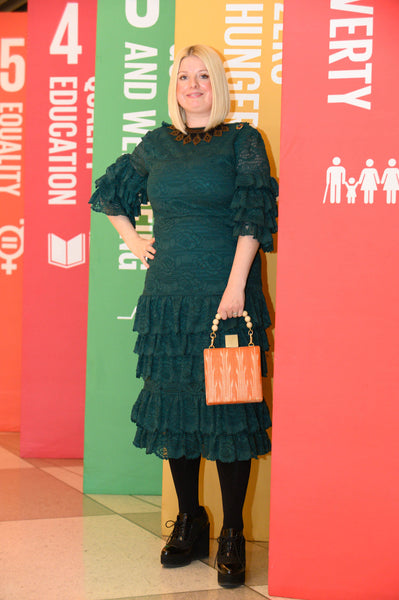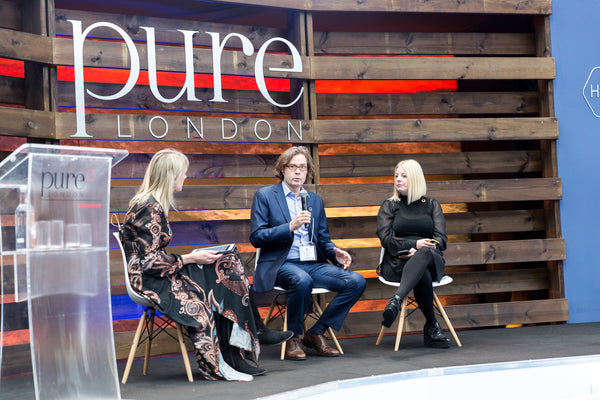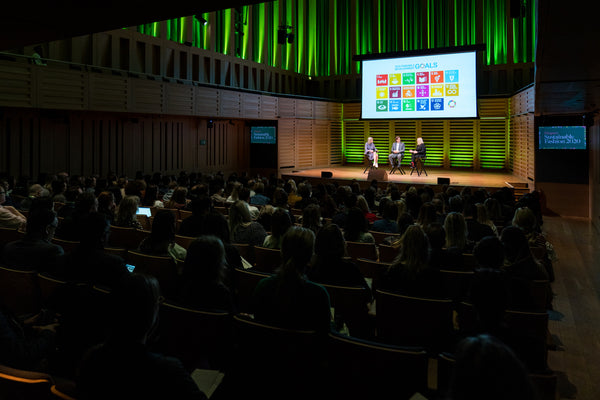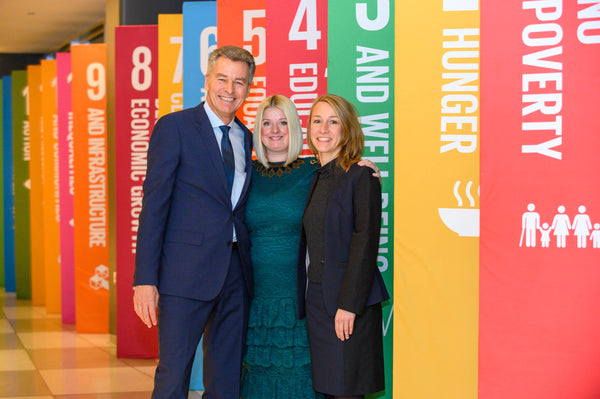A Chat with Kerry Bannigan
“Fashion and sustainability, these words are a part of my lifestyle – personal and professional – in my decisions, plans, ideas and actions.” says Kerry Bannigan. A match of personal and professional choices should be the recipe of her successful career, instead of a getting lost in the deadlocks of conflicts. Thanks to Kerry for her consistent endeavours in searching for solutions to the myriad of challenges in fashion. It was so precious to briefly hear about her story and her opinions for the today and tomorrow of fashion.

The Clothing Lounge: Honestly saying, when interviewing those whose presence in the fashion world is a kind of a starring character, it is not easy to choose one from the myriad of questions coming to mind. Let’s start by asking how the words “fashion” and “sustainability” entered your life?
Kerry Bannigan: Fashion has been a part of my life since childhood memories. Whether this be shopping days with my mum or her knitting or sewing or scouring charity shops with my Gran and her customising proud finds with her sewing machine.
Give back and paying forward have also been a part of my upbringing. As I entered into my entrepreneurial career in NYC aged 23 it was automatically within the brand’s plans to align with charities, provide support where we could and build platforms to showcase talent to be seen and heard globally. Over this decade of my career the word sustainability as it is referenced today encompassed eco, ethical, fair fashion, impact, give back and so on; and it was represented in businesses in various ways – an uphill battle that few wanted to address especially in fashion.
These words are a part of my lifestyle – personal and professional – in my decisions, plans, ideas and actions.

TCL: As the founder of the Conscious Fashion Campaign can you please explain what necessities does CFC cover in the fashion sector, which gaps does it fill?
KB: The Conscious Fashion Campaign, in collaboration with the United Nations Office for Partnerships, engages with leading global fashion industry events to accelerate collective action in support of the Sustainable Development Goals. The campaign facilitates high-impact partnerships that advocate sustainable solutions and innovations for the fashion sector to address the world’s most pressing social, economic and environmental issues.
The Conscious Fashion Campaign works with partners to provide education and awareness of the Sustainable Development Goals encouraging industry stakeholders and decision makers to integrate the framework into their business practices. The Conscious Fashion Campaign actively supports the Decade of Action by bridging together United Nations agencies and fashion industry stakeholders to enable the Sustainable Development Goals to scale.

TCL: You are located in USA but curated many events all over the world. If we compare the approaches of USA, Europe and Asia to sustainable fashion, do you see major differences?
KB: I grew up in England and moved to NYC at 21 years old. Immediately I saw a lack of support for fashion creatives in general in USA compared to the various funds, platforms, events and programs. I built my first business as a platform to support independent fashion designers to launch in the USA market. In regards to sustainable fashion each region has its priorities and with that comes what support may be available. Whilst the USA lacks governmental and policy support for sustainability at this time, we should not discount the entrepreneurs and academics relentlessly pushing disruption and innovation. Other regions have been implementing some level of sustainable efforts for a long time and continue to introduce new efforts. I feel in Europe sustainability is an ever evolving part of society and everybody is involved in doing their part from consumers to brands. European consumers have a furthered understanding of sustainable fashion.

TCL: At The Clothing Lounge, we try to provide an opportunity for many designers with their own brands, to curate their own unique designs. How can start-up brands align with the Sustainable Development Goals?
KB: The Sustainable Development Goals are the blueprint to achieve a better and more sustainable future for all. They address the global challenges we face, including those related to poverty, inequality, climate, environmental degradation, prosperity, and peace and justice. The Goals interconnect and in order to leave no one behind, it is important that we achieve each goal and target by 2030.
Governments, businesses and civil society together with the United Nations are mobilizing efforts to achieve the Sustainable Development Agenda by 2030. Universal, inclusive and indivisible, the Agenda calls for action by all countries to improve the lives of people everywhere.
Brands can review which Sustainable Development Goals align with their brand DNA and mission. It needs to be authentic and carried through responsible messaging to consumers. Brands use the Sustainable Development Goals in a variety of ways including reporting, auditing, for brand milestones, internal business planning and in turn external communication of their sustainable practices and methods.
Some Sustainable Development Goals to consider reviewing if anyone is unsure how the fashion industry aligns:
GOAL 5: Gender Equality
GOAL 8: Decent Work and Economic Growth
GOAL 10: Reduced Inequality
GOAL 12: Responsible Consumption and Production
GOAL 13: Climate Action
TCL: Due to the pandemic almost all fairs and fashion weeks are cancelled all over the world. Online fairs and webinars are taking place during these days of lockdowns. By considering the high costs of fairs and their carbon footprints due to the travel, can we say that there will be less global events in the coming years of new normal?
KB: This is an interesting on-going conversation amongst many at the moment. The pandemic has highlighted the ability to connect via technology in business more than we have ever before as a sector and it has also shown the urgency for effective and efficient implementation of sustainable development. With that in mind, technology is currently providing a more inclusive and accessible offering for the fashion community who could not have attended physical events prior. In-person is still something at this stage that people desire for business transactions/exhibitions but it needs to be considered what can be done at one annual tradeshow versus seasonal by a company and what are the true gains for all involved in the full fashion system. I applaud the industry currently for experimenting with digital platforms to keep the industry connected but so much more needs to be considered collaboratively for the future success of the industry.

TCL: The consumers, who drive the industry, how aware are they about sustainability? Fast fashion has created a consumer base who wants to buy at cheap prices and after not a long time wants to get rid of what was bought. Can this profile change? Did Covid-19 already create such change?
KB: Consumer education surrounding sustainability has been lacking however today we are witnessing more consumers following sustainable fashion voices, educators and impact figures. The fashion and advertising worlds sold society a misleading consumer profile that many desired to attain, without knowledge of the negative consequences to people and planet. It is not a question of can this change but when will this change as there should be no other option.
Some may say that in the wake of the pandemic people started to become more aware and connected to their choices, but on the other hand with the global economic fall out to follow will consumers continue to make conscious choices.
People try to discuss a silver lining from the pandemic but this continues to cause despair, harm already vulnerable communities further and prevent aid to some regions due to travel and lockdown restrictions. To be able to say that this ‘pandemic pause’ has provided positivity in your life is a privilege. If you have this privilege you should use it smartly to play your role in a sustainable future whether locally, nationally or globally and if you do not see your responsibility then please take the time to learn and support those that are providing resources and efforts for those that need it in a time of devastation.




